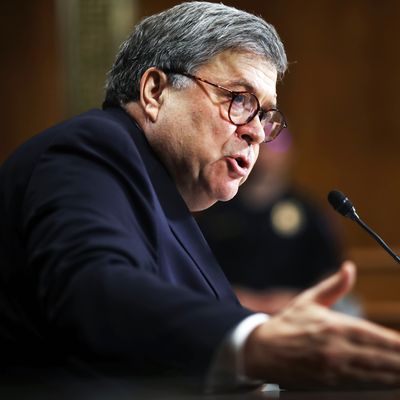
The most illuminating moment in William Barr’s Senate testimony came when he elucidated the bizarre theory of presidential immunity that got him the job in the first place. If an investigation is “based on false allegations, the president does not have to sit there constitutionally and allow it to run its course,” Barr explained. “That is important, because most of the obstruction claims that are being made here, or episodes here, do involve the exercise of the president’s constitutional authority. And we do know now that he was being falsely accused.”
This argument stacks several astonishing assumptions atop each other to produce a perverse conclusion. First, Trump could not possibly know that an investigation was unfounded, because it covered his entire campaign. Indeed, his first attempt to obstruct the inquiry came on behalf of Michael Flynn. Trump did not and could not know everything Flynn had done. He claims not to know much about the various contacts with Russia made by his subordinates, including the Trump Tower meeting. So the whole premise that Trump could know the investigation was groundless is not even a theoretically plausible description of his motives.
Second, Mueller did not say Trump was innocent, and nothing about the report concludes he or his subordinates were “falsely accused.” The report simply notes Mueller did not establish crimes at the level of certainty needed to prove them in a court of law. But it left much of the underlying conduct unresolved — exactly what Roger Stone said to WikiLeaks, or why Paul Manafort gave 75 pages of detailed polling to a Russian agent during the campaign, Mueller could not nail down.
Barr at times discusses these conclusions with the legal standard of a court of law. At one point in the hearing, he denied ever having “exonerated” the president. But then he toggles into far broader language, declaring Trump innocent and all suspicions false.
And third, Trump’s obstruction was quite possibly one of the reasons Mueller failed to establish underlying crimes. The president dangled pardons to numerous figures, including Stone and Manafort, the two Trump advisers who had the most direct cooperation with Russians, both of whom refused to cooperate with Mueller.
Barr’s argument is that the president can decide an investigation is unfair and shut it down, thereby preventing it from proving underlying crimes, and then use the lack of proof of underlying crimes to justify his behavior. By the standard Barr is articulating, Trump can probably get away with all the crimes he wants as long as his obstruction of justice succeeds.






























